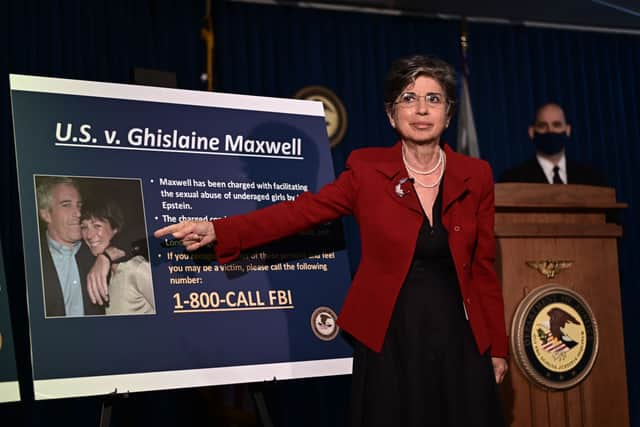Ghislaine Maxwell: prison sentence explained, who is Prince Andrew’s friend, how did she know Jeffrey Epstein?
and live on Freeview channel 276
Ghislaine Maxwell used to lead a life of luxury in New York.
She would often attend high society events with the likes of Donald Trump and Bill and Hillary Clinton.
Advertisement
Hide AdAdvertisement
Hide AdBut the invitations soon dried up when allegations of sex crimes surfaced about the former socialite, her ex-boyfriend Jeffrey Epstein and their friend Prince Andrew.
Maxwell has now been sentenced to 20 years in a US prison having been found guilty of sex-trafficking charges in December 2021.
The daughter of late media tycoon and ex-MP Robert Maxwell is now set to be the subject of a three-part Channel 4 documentary, which starts on Tuesday 5 July.
So what was Maxwell’s relationship with Epstein - and why has she been jailed?


Who is Ghislaine Maxwell?
Advertisement
Hide AdAdvertisement
Hide AdGhislaine Maxwell initially became famous through her late father Robert Maxwell, who has himself recently been the subject of a TV documentary series.
Born on Christmas day in 1961, she was the youngest of the former Daily Mirror owner’s nine children and was rumoured to be his favourite.
After completing a degree at Oxford University, Maxwell was put in charge of football club Oxford United, which her dad owned at the time.
But just short of her 30th birthday in November 1991, Robert Maxwell was found dead off the coast of the Canary Islands having apparently fallen overboard from the yacht he had named after her - Lady Ghislaine.


Advertisement
Hide AdAdvertisement
Hide AdAfter Robert Maxwell’s mysterious death, it emerged that he had left a £460m hole in his companies’ pension funds to keep his firms afloat and boost their share prices.
With her family’s fortune depleted and its status in tatters, Maxwell soon moved to the USA and started a career in real estate.
Around this time, she met the financier Jeffrey Epstein and the pair began a romantic relationship.
Epstein was believed to be extremely wealthy, owning large properties in New York and Florida, as well as an entire Caribbean island - although the source of his fortune was unknown.


Advertisement
Hide AdAdvertisement
Hide AdEven after their relationship ended, Maxwell and Epstein remained close - she was believed to have acted as a confidante and personal assistant to him.
When did allegations about Maxwell first surface?
The first sign of trouble came in 2008 when Epstein was jailed for 18 months by a Florida state court having pleaded guilty to prostituting underage girls.
In 2015, allegations emerged in court documents in Florida that Prince Andrew had had sex with Virginia Giuffre, née Roberts, who was 17 at the time and therefore considered underage in the state.
The papers said the encounters took place in 2001 at several locations, including at Maxwell’s home in Belgravia, London.
Advertisement
Hide AdAdvertisement
Hide AdPrince Andrew settled the civil case brought by Ms Giuffre in February 2022.


Ms Giuffre accused Maxwell of recruiting her to work as Epstein’s masseuse at his Florida home when she was aged 15 - a job that she said led to her being sexually abused by Epstein.
Maxwell was then sued by Giuffre for suggesting she had lied in these documents - a case that was settled out of court.
In 2016, Maxwell sold her New York townhouse and all but disappeared from public life.
Advertisement
Hide AdAdvertisement
Hide AdShe was then arrested by the FBI in July 2020 on charges related to Epstein, who had killed himself in a prison cell in August 2019 while awaiting his own sex trafficking trial.
Ghislaine Maxwell’s journey from extravagant childhood to US prison is set to be covered in Channel 4’s Ghislaine Maxwell: The Making of a Monster documentary, which will air at 10pm on Tuesday (5 July), Wednesday (6 July) and Thursday (7 July).
It will then be available on catch up service All 4.
What happened at Ghislaine Maxwell’s trial?
The trial began on 29 November 2021, with US commentators describing the case as a proxy for the trial Jeffrey Epstein was due to face before his suicide.


Maxwell faced six charges from federal prosecutors at her trial that were said to have taken place between 1994 and 2004, including:
- Conspiracy to entice minors to travel to engage in illegal sex acts
- Conspiracy to transport minors with intent to engage in criminal sexual activity
- Transportation of a minor with intent to engage in criminal sexual activity
- Conspiracy to commit sex-trafficking
- Sex trafficking of minors
- Enticement of an individual under the age of 17 to travel with intent to engage in illegal sexual activity
She also faced two separate perjury charges.


Advertisement
Hide AdAdvertisement
Hide AdMaxwell pleaded not guilty on all counts, but was found guilty of five out of the six charges.
The prosecution’s case centred around the testimony of some of four women who had been abused by Maxwell and Epstein when they were girls, as well as physical evidence gathered from Epstein’s homes - including a green folding massage table.
All four women detailed how the pair would lure them in with money, friendship and promises of favours, before “partner in crime” Maxwell would use massages as a way of getting the girls to touch Epstein.
They said she would then normalise their subsequent molestation and abuse by sometimes being in the room with the girls while these acts took place.


Advertisement
Hide AdAdvertisement
Hide AdFurther testimony came from Epstein’s former house manager, Juan Alessi, who listed in graphic detail a cycle of daily abuse that included three massages a day and sex toys.
In their defence, Maxwell’s lawyers sought to poke holes in the case by questioning the accusers’ memories and motives.
It appeared to be an attempt to hamper the requirement for the prosecution to prove its case beyond reasonable doubt.
However, her defence did not win over the jurors.
Why did Maxwell’s lawyers seek a retrial?
Soon after the trial concluded, a juror told media that he had convinced other members of the jury to believe the testimony of Maxwell’s victims because of his own history of sexual abuse.
Advertisement
Hide AdAdvertisement
Hide AdUnlike in the UK where it is illegal for jury members to talk about deliberations over a case, US jurors are able to speak freely once a trial has concluded - however, they must be deemed to be impartial when deliberating over a trial.


Using his first and middle names, Scotty David said some of his fellow jurors had been wavering over the women’s credibility.
"I know what happened when I was sexually abused. I remember the colour of the carpet, the walls. Some of it can be replayed like a video," he said he told the jury, according to The Independent and Reuters. "But I can’t remember all the details, there are some things that run together."
"When I shared that, they were able to come around on the memory aspect of the sexual abuse."
Advertisement
Hide AdAdvertisement
Hide AdMaxwell’s lawyers argued that because Scotty David had been abused in the past, he could not be impartial.
However, the judge dismissed this appeal in April 2022.
What happened at Ghislaine Maxwell’s sentencing?
Ghislaine Maxwell was sentenced to 20 years in a US prison on Tuesday (28 June).
Maxwell’s lawyers had called for a sentence of between four years three months and five years three months as they argued her reputation had already been irreparably damaged and that she had been tried for Epstein’s crimes rather than for anything she herself had done.


But the judge went with the US probation service’s recommendation of a 20 year sentence, meaning Maxwell will not be released until she is 80.
Advertisement
Hide AdAdvertisement
Hide AdIt could have been worse for the former socialite as US government prosecutors had called for a 30 to 55 year sentence.
The former socialite has already been held in a federal prison for two years.
Handing down Maxwell’s sentence, Judge Alison Nathan said the Brit had “repeatedly, and over the course of many years participated in a horrific scheme to traffic young girls, some the age of 14”.
Judge Nathan said it was important that although “Epstein was central to this scheme” she was not being sentenced “as a proxy” for him as her own conduct “was heinous and predatory”.
Advertisement
Hide AdAdvertisement
Hide AdShe added: “The damage done to these girls was incalculable.”
Some of Maxwell and Epstein’s victims delivered testimony at the hearing.


One woman, known only as ‘Kate’, said Maxwell was “a manipulative, cruel and merciless person”.
“Today, for the first time, I stand with my sisters – bound by a trauma I would wish on no-one,” ‘Kate’ said.
Advertisement
Hide AdAdvertisement
Hide Ad“Someone who even had a difficult or abusive father does not excuse sex trafficking of minors.
“A lack of remorse or responsibility from Ghislaine is exactly how we can tell that she doesn’t think what she did was wrong.
“She is not sorry and she would do it again.”
Before the hearing, it was believed that Maxwell would not apologise or admit any guilt because she was going to appeal her sentence.
However, the Brit did deliver an apology directly to her victims before her sentencing.
Advertisement
Hide AdAdvertisement
Hide Ad“I know my association with Epstein will follow and and forever stain me,” she said.
“It is the greatest regret of my life that I ever met Jeffrey Epstein.
“To you, all the victims that came to today inside the court and outside…I am sorry for the pain you have experienced.
“I hope my sentence… brings you closure… peace and finality. To help you put those experiences in a place that helps you move forward.”
